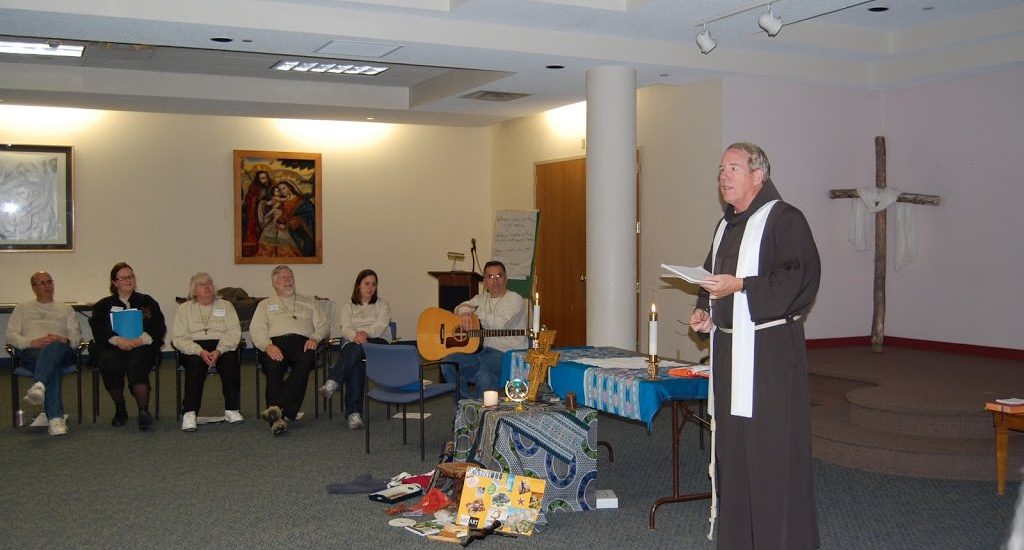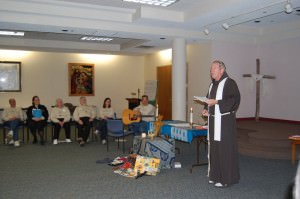An Ongoing Reflection: Franciscan Mission in the Third Millennium

This is the second series of reflections on mission by Fr. George Corrigan, OFM, that will appear monthly. Fr. George is a Franciscan Friar of Holy Name Province and an FMS returned missioner.

Part II: Mission as A Movement of Life and In Life
Among founders of religious orders, Francis of Assisi is the first who consciously included mission ad gentes (to the people of the world) as part of the order’s Rule of Life. Francis was clear about the ad gentes nature of mission in the Franciscan tradition: “But I tell you in truth that the Lord chose and sent the brothers for the benefit and salvation of the souls of all people in the whole world and they should be received not only in the land of the believers, but also in that of non-believers.”[1]
Clearly Francis held to the idea of the universality of mission, yet some people might find Francis’ distinction of the world as the twined categories of believer and non-believer to be somehow less than welcoming or out of sorts with our sensibility of what it means to be Franciscan. Yet note how Chapter 16 of the “Early Rule” (1221 CE) is named by Francis: “Chapter XVI: Those going among the Saracens and other Nonbelievers.” I mention this as a way of pointing you back to the first reflection where it was noted that the way you think about Jesus, church, when and how God’s reign is fully inaugurated, the nature of salvation, how the Church values human beings, and the role and value of culture – all these things affect the way in which one understands and carries out mission. As questions, these six topics remain present, even urgent, in every age because “how they are answered is how Christianity finds its concrete identity as it constitutes itself in fidelity to Jesus’ mission.”[2]
Francis was a person of his age – graced by God and unique in many ways – but his world and his vision differ from ours. We are blessed by his insight, experience and the tradition he passed on. But Francis, although the first to include mission in the order’s Rule of Life, was also the recipient of much older mission traditions.
Mission as “Crossing Over”
Francis’ vision of mission included the very strong idea of leaving one’s “camp” and crossing over to another “camp.” In other words, to be truly Franciscan is to be missionary across boundaries in whatever form one might encounter them. This idea of “crossing over” to another side is at the core of a modern understanding of mission. And its roots are as old as Sacred Scripture.
Donald Senior and Carrol Stuhlmueller[3] provide a magisterial treatment of the foundation of our contemporary missiology as rooted in the Hebrew scriptures. There is one particular element of that foundation that is especially formative and pertinent to our discussion: the idea of “election.” It is part of the language of Christianity to refer to the Jewish people and their religious ancestors, the Israelites, as “the chosen people” or “the elect of God” or, perhaps if one is familiar with the term, qahal Yahweh, literally, “the people of God.” It was a privileged position to be in their “camp.” So often we accept the expressions as a given, without considering the implications of the monikers. If they are “the chosen,” what about the remnant, the “unchosen”? What are the duties and responsibilities towards the “unchosen” if you are among the chosen?
A Wandering People
Stuhlmueller traces the election of Israel through the lens of the ongoing transformation of a wandering people. The word “Hebrew” is derived from the same Semitic root as ‘apiru (or ‘abiru), whose basic meaning is to “cross” or “pass on” or “pass through.”[4] The patriarchs of Israel (Abraham, Isaac, Jacob, and Moses) were all ‘apiru, people who were not originally connected with Palestine. The word ‘apiru is also used to describe many persons associated with the Hebrews in the wilderness where the idea of being “inside the camp” is cast in high relief against the hostile wilderness outside. The early roots of Israel were as a people being called by God to be his people and to enter his “camp,” a covenantal life symbolized by the Promised Land. This collection of wandering people entered Canaan and took possession of the land.
Once the ‘apiru become a stable, city-centered people under a monarchy, the ark placed in the Holy of Holies within the temple, a different word, go’el,[5] comes into use. Go’el describes those people inside the covenant, the redeemed,[6] as opposed to the unclean and those outcast from Israel.[7] It is at this point that the identity of an Israelite is established in terms of the blood relationship or clan bond.[8] The idea of “the elect of God” now had clear boundaries and markers like the land they inhabited; those on the other side were the “unelect.”
The Elect and the Unelect
Election was connected with the land. Walter Bruggemann wrote that the land, while it represented a source of life and stability for a nomadic people, is also a gift with seductive power. It tempts Israel to enter a life apart from the covenant in which barriers were erected for the unelect. If it is from saving love that God promises land and fruitfulness to a helpless people, an ‘apiru people, the qahal Yahweh are responsible for humbly sharing that fruit of election with those who would draw near.
In a way the story of the Jewish monarchy and the subsequent ride of the prophetic tradition of Israel is a tale of how the triumph of liberation-from-slavery and the homeless-finding-a-home began to reverse. A poor and defenseless people appeared, this time fellow Israelites, oppressed by kings and their courtiers who considered themselves the protectors of Yahweh’s people. In effect what transpired was that the operative understanding of go’el began to exclude part of the people Israel. Eventually those “outside the camp”[9] included not only Gentiles, but also Samaritans, the poor, the marginalized, and the powerless Jews. A “lay movement” arose to challenge the kings, priests, and official court prophets. The prophets (Amos, Hosea, Micah, Jeremiah, Isaiah) reached back to the ancient covenant to call the leaders to hear the cry of the poor and take urgent action. It is out of secular origins of injustice that the prophets arose to cry out for salvation in the name of the marginalized, oppressed, and enslaved.
A Lay Movement of Mission
It is out of this “lay movement” that the prophet Isaiah proclaims (and reminds) that the salvific intent of God is that all the nations be saved and that Israel’s part was to be heralded of the universal salvific offer: “It is too little, he says for you to be my servant, to [simply] raise up the tribes of Jacob, and restore the survivors of Israel; I will make you a light to the nations, that my salvation may reach to the ends of the earth” (Is 49:6).[10]
An early reviewer of this reflection asked why I did not begin with Jesus and root the misison of Francis in his reflection on the Life of Christ (that will be the focus of a future reflection)? The answer is rooted in our baptismal vows. During the Rite of Baptism we are anointed with the words, “Just as Christ was Priest, Prophet and King…” and commissioned to share in those roles. I would suggest that Jesus’ missionary posture is contained within the role of prophet. As such Jesus stands within an already existing lay movement of mission.
Just as the prophets of old stood with the ‘apiru people witnessing to the go’el people, so too did Jesus stand with the ‘apiru people (the poor, the widowed, the alien, the orphan- or in modern language, the poor and marginalized) in witness to the go’el of his day – or in modern language, the poor and marginalized) in witness to the go’el of his day- the rich, the powerful, the institutional religious leaders, the political leaders, and all who erected barriers to planting the reign of God within our lives.
It is shocking for some to think of Jesus within a “lay movement,” but in his role as prophet of God, Jesus stands within an existing tradition, which he completes and perfects, even as he forms the sure foundation for all our missionary and prophetic endeavors.
The Early Franciscan Lay Movement
In Francis’ time the “camps” were Christian and non-believers. Francis possessed the Christ the Prophet as a central defining guide to this life and the next. He possessed a fidelity to a common book (Scriptures) and heritage (Catholic tradition). He held that salvation was found in Christ alone and that the missionary charge was to extend that salvation to the ends of the earth. In these things he is like the missionaries who went before and those who came afterwards.
Perhaps what makes Francis’ vision of mission unique is how he saw the reign of God being inaugurated and its focus on the poor – the ‘apiru people. And so he crossed over and joined them – be they believers or no. It was mission as a movement of life and in life – from privileged merchant class to homeless poverty; from a Christian in Western Europe to missionary disciple “among the Saracens;” from playboy to prophet – and so much more. Francis crossed over.
A Closing Thought
In this millennium, one element of Franciscan mission continues to be that willingness to “cross over.” But the intent is not simply to stand with the others. The intent is always to call both sides of the divide to form one “camp” and to witness to the inauguration of the Reign of God in the here and now. Francis’ strength was his ability to speak to both sides – in other words, if one looks at the life of Francis through this missionary lens, one sees a herald of the kingdom, seamlessly moving across boundaries in both directions: from Pope to Sultan, from pauper to royalty, from believer to unbeliever, and even from fearful town people to hungry wolf.
Mission is not necessarily linked to geography – but it is always linked to location. We live in a world in which we are constantly being segmented by demographics, likes/dislikes, religious affiliation, political persuasion, and a host of arbitrary and inherited borders. Our “home” is always located with Christ, but our “location” is always at the border crossings, living and proclaiming the Reign of God.
May God give you peace.
[1]
[2]
[3]
[4]
[5] Ibid., 19.
[6] Ludwig Koehler et al., The Hebrew and Aramaic Lexicon of the Old Testament, vols. 1–4 combined in one electronic edition (Leiden and New York: E.J. Brill, 1999, c1994-1996), 169.
[7]
[8]
[9]
[10]
Tagged in:
